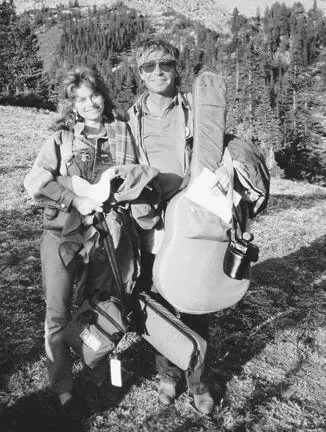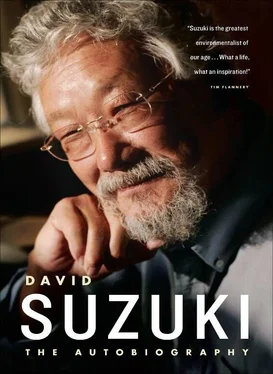Celebrities began to lend their names to the cause. I called and recruited the Canadian singer Gordon Lightfoot, who flew his entire band to the Stein to perform free. Later, Gordon became a very good friend and donated a large sum of money that pulled the festival out of debt. He had asked me to tell John McCandless how much he would give, and when I did, John's face sagged with relief and his eyes welled with tears.
Somehow, in 1987, I was able to find a phone number and call the American singer John Denver, who answered the phone himself and said he knew who I was. He accepted my invitation to perform at the Stein, and, like Lightfoot, he traveled in at his own expense, flying his plane to the Kamloops airport. His performance in the alpine meadow high up in the valley was the highlight for the two thousand people who had hiked up the mountain.
John became a friend and invited me to give talks as his guest at Windstar, his retreat/think tank near Aspen, Colorado. He was a huge talent, and he supported environmental groups around the world; yet he was surprisingly insecure about his failure to have a big hit record for years. He told us proudly how, when visiting China, he had come upon a peasant who did a double take and shouted, “John Denba! Countly Load!”
In 1997, Tara and I were driving back to Vancouver from Williams Lake and stopped at the same Lytton motel that had always been our Stein headquarters, overlooking the ferry that crossed the Fraser River to the trailhead of the Stein. Out of the blue, the radio announced that a plane being flown by John Denver had plummeted into the Pacific off Monterey, California, killing him. We were stunned. I'm glad John knew before he died that the Stein Valley had been set aside as a provincial park.
Tara worked full-time on the Stein campaign as the unpaid Vancouver coordinator. She was able to get the Hawaiian phone number of the Canadian First Nations singer Buffy Sainte-Marie and called to ask her to sing at the Stein Valley Festival. Buffy had to go to an audition for a job in Washington, D.C., and agreed to perform on condition that we pay for an executive-class round-trip plane ticket from her home in Honolulu to Vancouver and then to Washington. That would be a very expensive item, but she was a huge star and we agreed.
That summer, she flew in to Vancouver, where she was put up in a hotel. She didn't want to drive all the way to the Stein, so we had to charter a helicopter, at great expense, paid in advance, for her flight the following morning. Tara and I were already at the festival site when we learned that Buffy had slept through the morning flight-departure time and now insisted she be flown up in the afternoon. We had no choice but to pay for the helicopter a second time.
But when she arrived at the festival, her impact on the First Nations people there was electric. I immediately saw the value of having a headliner with whom the First Nations could identify. The audience was ecstatic, and it was clear to me that however much of a pain she had been, she was worth it. Buffy was a real pro, her unique voice projecting warmth and charisma onstage while telling the rapt audience how happy she was to be there. Afterward she climbed into a car to go back to the airfield and disappeared in the chopper back to Vancouver and on to Washington.

John Denver and his wife, Cassandra, at the 1987 Stein Festival
In October 1987, B.C. forests minister Dave Parker, who had been chief forester overseeing the clear-cutting of the Nass, the sacred valley of the Nisga'a, gave the go-ahead to log the Stein. The rationale was that it was “only” to be 22,000 of the 260,000 acres in the water-shed, but it would have cut out the heart of the valley bottom. However, the buildup of support for protecting the valley paid off: because of the festivals, the Stein had become too well known and support for its protection too great to send the loggers in.
By 1988, 3,500 people were attending the Stein Valley Festival. The following year, 16,000 people drove to the event, held at the rodeo grounds near Mount Currie. They were entertained by Canadian stars Bruce Cockburn, Gordon Lightfoot, Colin James, Valdy, Blue Rodeo, and Spirit of the West, among many others. The festival had become so huge that it now made money, and I was sure the size of the crowd ensured the valley would never be logged. In one of many dramatic moments, Woody Morrison, a Haida, rose and told us he had served in the U.S. military in Vietnam, but even the most heavily bombed land he had seen there had not been as devastated as the clear-cut area visible behind him. In another, Hollywood director and Canadian Norman Jewison got up on the stage to announce that he and American singer Cher were contributing $5,000 to the cause.
That was the last Stein festival I attended, because, as with Windy Bay, I was sure public support had reached a level that meant no politician would ever dare allow the valley to be logged. That goal had been the rationale for the festival in the first place. In 1995, B.C. Premier Mike Harcourt held a ceremony with Chief Ruby Dunstan and Chief Leonard Andrew to set aside the entire watershed as Stein Valley Nlaka'pamux Heritage Park, administered by the Lytton First Nations and B.C. Parks. Now, each time I return to hike up the valley, it is gratifying to think the ecosystem will continue to flourish long after we are gone.
IN BOTH HAIDA GWAII and the Stein Valley, the battle was led by First Nations. Theirs was a struggle over land, not for the superficial needs of money, jobs, or control, but for the most powerful need of all — to remain who they are. In the past, and even in the present, environmentalists often recruited First Nations communities to support their agenda of protecting forests, rivers, and wildlife without regard to the people's even broader cultural and spiritual needs. In sharing their land as park reserves, the Haida and Lytton people gained tacit recognition that these areas are part of their territory but are to be protected for all people for all time. It is a generous gift.
SEVEN
ADVENTURES IN THE AMAZON
WHEN I WAS A BOY, I would sneak a peek at Dad's adventure magazines, which carried tales of true-life adventures in exotic places. The ones that would make my heart beat wildly described the Amazon, a place I yearned to visit.
I loved reading about the Indians who wore feather headdresses, their bodies painted in patterns blending with the dappled light beneath the tree canopy as they hunted for game with blowpipes and arrows tipped with deadly poisons. In the 1940s there were still many parts of the globe that had not been explored by people from the industrialized world; the Amazon rain forest remained a vast and mysterious ecosystem, rife, according to the magazines, with terrifying diseases and parasites. Piranhas and giant anacondas filled the rivers; jaguars and armies of deadly ants lurked in the forest. These terrors were balanced by the spectacles of colorful parrots and dazzling butterflies and, most of all, beetles. I had fallen madly in love with insects, but beetles especially held me in thrall.
In 1988, at the age of fifty-two, I had my chance to realize my boyhood dreams. In August, The Nature of Things with David Suzuki crew traveled to Brazil to begin filming for a special program on the rain forest's ecosystem. A month later, filled with anticipation, I flew to the outpost of Pôrto Velho, capital of the state of Rondônia, to hook up with the crew. But my first glimpse of the legendary forests was bittersweet: we were there to bear witness to its destruction.
Читать дальше



![David Jagusson - Devot & Anal [Hardcore BDSM]](/books/485905/david-jagusson-devot-anal-hardcore-bdsm-thumb.webp)









